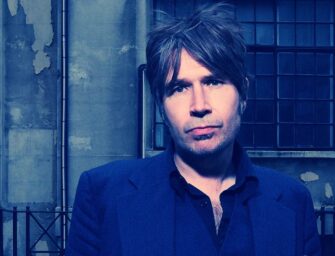
Pete Waterman: “Songs are more serious than life, aren’t they? You shouldn’t be a songwriter if you don’t want to get beaten up!”
The British songwriter-producer of 80s hit factory Stock Aitken Waterman and candid Pop Idol judge, shares his story and advice
![]() erhaps best known as one-third of the phenomenally successful Stock Aitken Waterman (SAW) songwriting and production team, Pete Waterman has sold in excess of 500 million records around the world over five decades. Born in Stoke Heath, Coventry in 1947, Pete’s musical career began as a DJ entertaining crowds across the UK with a blend of rhythm and blues and soul music, before taking up work as an A&R working with Philadelphia soul artists, which included introducing the Three Degrees to the UK.
erhaps best known as one-third of the phenomenally successful Stock Aitken Waterman (SAW) songwriting and production team, Pete Waterman has sold in excess of 500 million records around the world over five decades. Born in Stoke Heath, Coventry in 1947, Pete’s musical career began as a DJ entertaining crowds across the UK with a blend of rhythm and blues and soul music, before taking up work as an A&R working with Philadelphia soul artists, which included introducing the Three Degrees to the UK.
In 1979, Pete set up the music production company Loose Ends with Peter Collins, and enjoyed considerable success with artists like Musical Youth and Nik Kershaw, before setting up his own company, PWL (Pete Waterman Limited) in 1984. Soon after, he signed producers Matt Aitken and Mike Stock, who produced the song Whatever I Do for Hazell Dean, and Stock Aitken Waterman was born. The trio achieved their first UK No 1 single in 1985 with You Spin Me Round (Like a Record) for Dead Or Alive, and then went on to become one of the most successful songwriting and producing partnerships of all time, scoring more than 100 UK Top 40 hits, selling 40 million records and earning an estimated £60 million. To date, Pete Waterman has scored a total of 22 UK No 1 singles with his various acts, including Kylie Minogue, Rick Astley, Bananarama, Steps, Mel & Kim, Donna Summer, Sinitta, Cliff Richard and Jason Donovan.
Songwriting had the pleasure of catching up with Pete, busy in his office at PWL headquarters in London, ahead of A Life In Song – a celebration of his career at the Royal Festival Hall in July. The colourful conversation shed light on a fascinating career and stimulated some forthright opinions on the songwriting process of a prolific hit-maker…
When did you first fall in love with the craft of songwriting?
“Church music. Hymns are some of the best songs ever written. By the very fact that they pulled people into churches, they did the job they were meant to do. That’s what made church so popular, it wasn’t the dry, boring lectures, but the uplifting hymns, I think, people aspire to. In my case, I learnt very early on that songs move people. When you can see what that does, you want to be doing that job, to create that.”
So did you go to church and sing in the choir?
“Yeah, well I was in a sort of designate choir from 1956 onwards, so when the cathedral had been built I was going to be a choir boy, but by then I was bored with church music and was into The Beatles!”
[cc_blockquote_right] IT’S NOT JUST ABOUT WRITING SONGS, IT’S ABOUT HAVING HITS [/cc_blockquote_right]Could you see a parallel between hymns and pop songs back then?“Well, that’s all they are. Some of the best pop songs are nicked from hymns; Christmas carols have been nicked more than once. She Loves You isn’t a million miles away from a Christmas carol; the cadence is the same. Particularly with The Beatles, English church music is prevalent in the chord structures. That’s very much of the period before American music dominated and, you could argue that, The Beatles were successful because of their use of British chords like Am7. They were less sophisticated than some of the American chords. You didn’t think so at the time, but when you listen back now – I was buying Roy Orbison, Bill Haley and Buddy Holly, before the Beatles – they were fundamentally very different. Then again, in Lennon and McCartney, you’ve got two songwriters from the North of England who were steeped in Lancashire tradition [Liverpool’s county pre-1974] and it’s very much that George Formby chord sequence. That was our background, then American music came to us through the war and after, and it had an impact; it was a different way of looking at music.”
Did you find yourself analysing song structures when you were young?
“Yes, because the American songs, to me, gave a message that was real and useful – there was a real seriousness about them; the lyric was great and thought-through. English songs didn’t feel real and were a bit ‘moon’, ‘June’ and ‘soon’. The American songs, particular early doo-wop, had a street level that you could relate to, where a lot of the British songs were ‘second-hand’.”
What was the moment when you went from appreciating music in this way, to making music? Were you in bands as a kid?
“Yeah, yeah of course, everybody who saw The Beatles formed a band. There’s no question, that’s what you did. I could sing, so I could always be in a band because they were always looking for a singer, but I soon realised that I wasn’t good enough; the frontline thing wasn’t for me.”
So then you became a DJ?
“Yeah, but when Motown moved from Detroit and went to California, it cut my livelihood off because my crowd wouldn’t dance to anything but Motown. That’s why we went and found Northern Soul. We just couldn’t play James Brown, Stevie Wonder and stuff like that; our audience was still locked into songs. So that’s when I suddenly found myself having to do instrumentals and you progress from there.”
When was your transition from producing instrumentals to writing songs?
“It was more of a learning process. I just did it, but I didn’t enjoy it because I wasn’t working with anybody that made it worthwhile. That’s the thing with songwriting: I think anybody can sit down and think they’ve written a song, but it’s about the satisfaction you get. It’s not just about writing songs, it’s about having hits.

Mike Stock, Matt Aitken and Pete Waterman (left to right) clutching their haul of Ivor Novello Awards
“I’d written a couple of songs back in the early days, when I first came into the record industry – one was a Top 30 hit, but it was a bit naïve, to say the least. Yes, I sat down and wrote songs, they got covered and I got minor hits, but I wasn’t satisfied because, to me, they weren’t good enough. Just having them recorded wasn’t it to me. I was as fiercely critical of my own songs as I was when other people played me demos.”
So was it all about being ambitious and commercially successful?
“Well, yes. It wasn’t until ’83, just after I’d done Musical Youth, that I realised: to have a hit, you’ve got to have a flow of songs and, in all truth, it’s [maintaining] the flow of songs that will give you hits, or not. When we started to produce with Stock Aitken Waterman, the need for songs was enormous. Certainly after our first No 1, which was You Spin Me Round (Like a Record), we realised that our problem wasn’t making records; it was actually finding records that were worth recording. We were getting phonecalls to produce artists but, when we heard the song, we were just laughing; it was appalling. I think the way we approached it was: if we couldn’t do better than that, we wouldn’t bother. Pete Burns had this wonderful saying: ‘Pete Waterman was the best turd-polisher in the business.’ But I didn’t actually want to polish turds!”
So would you say you were the driving force behind Stock-Aitken-Waterman?
“In the very early days, our first few songs were basically Matt [Aitken] and Mike [Stock], with me adding little bits and pieces; guiding, not inputting. Then you suddenly realise that songwriting is 10 parts perspiration and one part inspiration, but without the inspiration it doesn’t work. It’s about the guy who’s got the inspiration for why you write the song. Everybody’s role is important, but you can’t take away the guy who has input with the start, the title and the idea.”
What was the dynamic between the three of you?
“Oh we’d fight like cat and dog. Songs are more serious than life, aren’t they? You shouldn’t be a songwriter if you don’t want to get beaten up! Everybody’s got an opinion when it comes to songs, so you have to be absolutely immune to criticism. We were our own critics and, when we were writing a song, sometimes one person would write two-thirds of it, or one-third, or whatever… That’s where everybody gets this wrong: there is no formula, you’ve got to feel it. We used to fight over everything, over every lyric. Mike would get a bee in his bonnet about a certain lyric and no matter what you did you wouldn’t persuade him, Matt would have an idea about a lyric and you wouldn’t persuade him, I wouldn’t budge on something… You had this constant fight between three people trying to get the best out of a three-minute pop song.”
[cc_blockquote_right] IF YOU’RE NOT GOING TO PAY ME, I’M NOT GOING TO WRITE YOU A SONG [/cc_blockquote_right]
So you didn’t have set roles in the team?
“No, no, that’s what I’m saying; that’s a myth. We all had an input – whether it was five percent or eighty percent – without the three of us, the songs wouldn’t have been written. Sometimes when I had an idea, Mike would think it was too naïve, and change it, and make it into an amazing song. Likewise, Matt was very technical so he’d come in, play something and everybody would go, ‘You’re playing with yourself, simplify it!’”
What would a typical day in the studio consist of? Did you treat it like a 9-to-5 job?
“Yes, definitely. It was actually 11 till 9, Monday to Friday. But the meeting in the pub the night before was really important, because we’d work out what we’d done and what we were doing. Then the next day we’d know what roles we’d got, whether it was: go away and come up with some lyrics, go away and come up with a song, go away and come up with some ideas. All three of us were working on different plots at any one time, because it was like a treadmill; songs would be written with the vocalist in the booth. Sometimes that’s the best way to write, because you don’t have time to sit down and navel-gaze. Sometimes you can get too clever and over-think everything.
“The best songs we ever wrote were written literally when somebody said, ‘We’ve just had a call from Kylie, she’s on her way in and trying to avoid the papparazi, so you’ve got a two-hour wait.’ And we thought, ‘Shit, we haven’t even got a song yet!’ But somebody said, ‘Better the devil you know’ and we all went, ‘That’s the song.’ Bang! In one hour the song was written and in three hours it was recorded. It was just a great title and it tells you what the story is.”
Were you always writing for a specific artist, or did you ever just write a song for the sake of it?
“No, that’s a waste of money! I haven’t got that much time. If you’re not going to pay me, I’m not going to write you a song, and I mean that in the nicest possible way! Everybody can enjoy songwriting, but the art of being a songwriter is exceptionally difficult. People like Elton John, Paul McCartney, John Lennon, Burt Bacharach and Hal David, and Carole King – these are all very, very special human beings. They’re not normal!

Stock Aitken Waterman. Pete: “The three of us beat the shit out of each other”
“The problem is, since the Beatles, people have tended to think that anybody’s not talented if they’re not songwriters. But that’s not right. The Beatles were unique and certainly 99.9 percent of us will never reach the standard of Lennon and McCartney; we shouldn’t even bother trying.”
Out of all the artists you’ve worked with, like Kylie Minogue, Rick Astley, Bananarama, are there any that we might be surprised to hear had some input in the songwriting?
“No, none at all. We didn’t even have time to write our songs, let alone getting their opinions! This is the modern myth where you get 13 people credited for writing a song – they don’t, it’s impossible. The three of us beat the shit out of each other, so if they’d all got involved it would be like a crusade!”
You fought everytime you each had an idea, but what happened if you ‘dried up’?
“We never did. Well, we didn’t have writer’s block, but we did have breaks in concentration. So, when it got too intense, we’d take a break and play word games or come up with fish jokes.”
Fish jokes?
[cc_blockquote_right] I DON’T WRITE WITH MANY PEOPLE BECAUSE I FIND IT EMOTIONALLY STRESSFUL [/cc_blockquote_right]
“Yeah, we’d play that for hours: ‘motorpike and side-carp’, ‘I’m having a whale of a time’ and ‘stop floundering’. Then Matt and Mike would go into a Monty Python routine that would last for hours. That eased the tension and allowed us to get back to work.”
Are you still involved in songwriting now?
“I’m working with a new band at the moment, called The Baby Jaynes – they’re very good songwriters, but I’m letting them develop. I’ve been doing some songs over the last two years, but songwriting is about the magic between two or three people. You know when you find it and you never lose the ability to write a song, but you’ve got to to find the team that make that song work – it’s almost like looking for the golden ticket in the Willy Wonka bar! I keep looking, but I don’t write with many people because I find it emotionally stressful. It really is quite difficult, pouring your heart out and you make a fool of yourself sometimes; you’re showing people your weaknesses.”
Is that because you’re writing from personal experience?
“A guy once told me that I must’ve had the most tragic love life in the history of the world! But you don’t have to fall out with every woman in the world to know what hurt’s about. Or you make it up. Lamont Dozier is a great friend of mine and he said, ‘There are only three songs: I love you, I hate you, go away and come back!’ He’s absolutely right.”
How did you become friends with Lamont Dozier?
“When I did Musical Youth, I went to LA to do the album and got Lamont involved and brought him back to work with Phil Collins. I co-wrote Invisible with him and Alison Moyet, so that was when I really took songwriting seriously; I realised it was about work. Without that there would’ve been no Stock Aitken Waterman. That’s what made me realise it wasn’t all mystical; it was about applying yourself to it.”
Interview: Aaron Slater
To hear more of Pete’s anecdotes and songwriting insight, in person, visit the Royal Festival Hall on Wednesday 29 July 2015 for A Life In Song: Pete Waterman, with onstage interview by Michael Grade, full band and guest artists, including Hazell Dean, Cathi Ogden, Denise van Outen and Steps’ Clare Richards. For more details and to book tickets, go to: www.southbankcentre.co.uk



































Related Articles